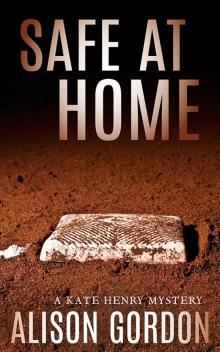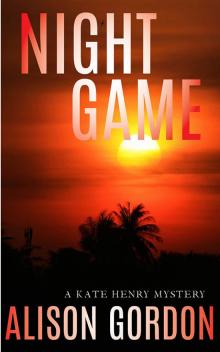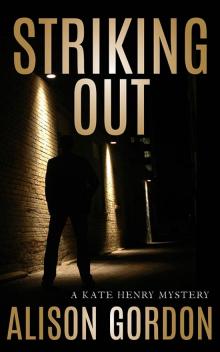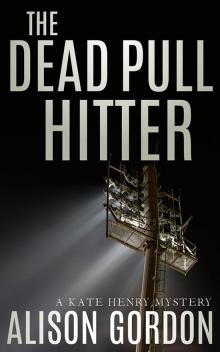- Home
- Alison Gordon
The Dead Pull Hitter Page 2
The Dead Pull Hitter Read online
Page 2
“Hi, Archie. Nice game tonight.”
He looked a bit embarrassed, and maybe a tad tipsy.
“Can I ask a favour, Kate? It’s personal.”
“Why not?”
“Could you stop calling me Archie? I hate that name.”
“We’ve been calling you Archie all year. Why didn’t you say something?”
“I’m a rookie. What could I say?”
“The season you’ve had, they should call you anything you want, Mark.”
He smiled, a little sheepishly.
“Thanks. It’s really been getting to my mum. Mark was my dad’s name.”
His father had died when Griffin was nine. His mother was a professor of medieval history at the University of Toronto who didn’t know what to make of the alien being she had created.
“How is your mum? Enjoying the pennant race?”
“You wouldn’t believe it, but she is. She even rented a TV.”
“Amazing. You’re up.”
Griffin turned and went to the immigration desk. It didn’t take him long to be passed through. I had my citizenship card out, gave it to the inspector, told her I had nothing to declare, and was handed a card with a code scrawled across the top, describing me, I hoped, as an upstanding citizen.
I met Gloves Gardiner on the escalator to the baggage claim. Just the man I wanted to see.
“What was that all about between Preacher and Thorson?”
“Sir Stephen’s got his shorts in a knot and Preacher was handy.”
“What’s his problem now?”
“He’s in a fight with his agent.”
“Sam Craven? I thought he fired him.”
“So did Steve. But there’s still six months to run on their contract and Craven’s not going to stand aside. He’s threatening to sue.”
“I don’t blame him. Thorson’s Titan contract is up for renewal and his agent’s cut will be a nice little taste.”
“You got it. Craven showed up at the stadium before the game tonight. Before you got there.”
I’d missed the team bus, distracted by a late lunch with an old flame during which we had challenged the Aquavit supply of a Danish restaurant near his office. The players who had noticed I missed the bus were giving me a hard time about it.
“What happened?”
“Some shouting in the clubhouse.”
“Were any of the other writers around?”
“No.”
“Thanks for the tip.”
“You didn’t hear it from me.”
“Hear what?”
Gloves was my spy. A man with a strong iconoclastic bent, he had taken a liking to me as soon as he saw how much some of the other reporters and players disapproved.
He has been around for dog’s years, never a star, but good enough to hang on. He’s appreciated not for his hitting or, goodness knows, for his speed on the basepaths, but because he knows how to handle his pitchers: which one needs coaxing, which one needs teasing, and which one needs kicking in the ass. He’s aware of how much each had to drink the night before, and after a few warm-up pitches he can tell what pitches are working and which aren’t, better than the pitcher himself.
He’s an odd athlete. He went to college for more than sport. He majored in English and history in the last gasp of the politicized sixties, and he both protested against the Vietnam War and lost his best friend to it.
I leaned against a post by the carousel and yawned. The players were playing baggage roulette, a ritual at the end of a road trip. Flakey Patterson collected a dollar from each player, and the pool went to the guy whose bag appeared first. Preacher Kelsey won it for the second time in a row. He and Eddie Carter exchanged low fives while the others muttered darkly about a fix.
My bag was the third. I grabbed it and humped it past the weary-looking customs agent, who took my card and let me go.
Even at that hour, the waiting area outside was crowded with women and small children, the players’ families. The wives were carefully coiffed and made up, most of them dressed to the nines. The kids were cranky.
Until six months ago, I’d had someone waiting for me, too. Mickey used to joke about the recipes he’d exchanged with the other wives and threatened to run away with one of them every time the plane was late.
Mickey worked for the CBC, a nice, solid liberal man who had decided after living with me for three years that he wanted someone waiting for him when he got home. Our parting had been passionless. Now I use an airport limo.
There was a larger group than usual waiting. The booster club was also on hand, sitting off to one side under a crudely painted banner. They were a sweet but sorry collection of misfits wearing Titan hats and T-shirts. Rodney Hart, the pimply teenager who published their newsletter, called my name. I waved and went the other way, in no mood for statistical analysis at that hour. Besides, he’d probably phone and let me know what he’d found. I could always count on Rodney, bless his heart.
Grumpy drivers waited by half a dozen limos, forced to wait until the last plane landed. That was us, but they wouldn’t get any business from the ballplayers. What are wives for? Only those of us on expense accounts were customers.
I passed up the first one on principle. He had an anti-smoking slogan prominently displayed. He was still yelling at me when my driver pulled away from the curb. We both lit up.
He was a wonderful driver. He put on a classical tape and didn’t say a word. We glided down the 427 to the QEW, towards the blinking lights on the CN tower. Home.
I was dozing when we turned down my street, floating on music. The canopy of trees, lit by the street lights, had a golden glow. Autumn was coming.
My front porch light was on, a welcoming beacon left by my tenant, Sally Parkes. She shared the ground-floor flat with her son. I shared the second and third floors with Elwy.
I heard him as soon as I unlocked the door. A thud off the bed, followed by the heavy patter of paws and guttural meows of inquiry. He came into the living room, saw me, sat down, and began to groom himself.
“Ignoring me again? This is what I get after ten days on the road? Come on, you big fat fraud. Where’s my welcome?”
Elwy looked at me, his right front paw poised in front of him. His attempt at injured dignity failed, as usual. He’s a twenty-pound neutered tom, with black-and-white markings that give him a silly moustache and droopy pantaloons.
I dropped to my knees and meowed at him, scratching the carpet. He stood up and walked heavily to me, lay down, and rolled over. I scratched his stomach. He closed his eyes and purred, kneading his claws at the air.
Other women have husbands or lovers. I’ve got Elwy. He’s at least as affectionate as most men I know, and a lot less complicated. He’s always there when I come home from a road trip, and he never asks any questions or nags me about anything but his next meal.
The reunion over, I checked through my mail. A lot of people wanted money: Ma Bell, Visa, Consumers’ Gas, two diseases, two poverties (one Third World and one local), a peace group, a women’s shelter, and the New Democratic Party. Maclean’s offered me a free telephone with my subscription, the National Ballet offered me expensive seats to the series of my choice. A postcard from my sister Sheila on safari in Kenya made me jealous, a letter from my parents made me realize I hadn’t called lately, and a note from my dentist reminded me it was checkup time. No money.
I took my suitcase to the bedroom, propped my briefcase on the stairs up to my study, and took off my clothes. I was too tired to brush my teeth.
I pulled a big T-shirt out of my dresser and rolled into bed without setting the alarm. Just before I fell asleep, Elwy jumped up beside me and curled up under my chin the way he had since he was a kitten. It was ludicrous for a cat his size, but we had adjusted over the years. The last sound I heard was his purring.
&n
bsp; Chapter 3
The first sound I heard the next morning was the goddamned phone. I rolled over, saw it was 8:33, and grabbed the receiver before it could emit another obnoxious warble.
It was Ambrose Callaghan, the assistant sports editor. Who else? He is young, ambitious, and officious beyond the call of his small duty. He is in charge of the sports pages overnight and is incapable of ending his shift without crossing every t and dotting every i on his turnover note for the boss.
Or maybe he just gets lonely. His yearning to reach out and touch is particularly annoying on West Coast road trips, since he’s shaky on the concept of time zones. The last time I was in California, he called at six in the morning to ask what days off I planned to take during the next home stand.
“Kate, I’ve been thinking,” he said. Uh oh. “We need a good set-up piece for the Red Sox series. What are you planning to write today?”
“A game story, Ambrose. The series starts tonight. It’s a bit late to set it up for tomorrow’s paper. Don’t we have the pitching matchups and comparative stats in today?”
“I was thinking in terms of something a bit more psychological. The pressures of the pennant race. There’s a lot of interest in the Titans right now. We can use a lot more than you’re giving us. The Mirror’s got eight pages today.”
Aha. It all became clear. The publisher had visited Rosie’s desk on his way to the men’s room again. He can’t tell a line drive from a foul tip, but he knows what sells papers.
“Okay. I’ll give it some thought.”
“Are you taking any days off? You’ve got a lot of time owing.”
“Gee, Ambrose. With all this space to fill, I don’t see how I can do it now.”
“But you’re up to twenty-three days.”
“I’ll talk to Jake about it. And thanks for calling. I appreciate the advice. And I think the psychological angle is just the thing. You tell Jake I’ll get right on it.”
The Planet didn’t pay all that well, but our union had built in some protection for people like me. Every day I worked over five in a week, the paper owed me a day and a half back. And there are no days off on the road. I could usually accumulate six weeks’ paid vacation between the World Series and the winter meetings. I was right on target. Luckily, Jake Watson, my editor, understood this nuance of labour-management relations. Rosie was the only one who ever bugged me.
I thought of going back to sleep, but Elwy had other ideas. He hopped off the bed and stood by the door, meowing.
“Right, Fatso. Breakfast time.”
I grabbed my old terrycloth bathrobe, one of Mickey’s castoffs. Like me. To Elwy’s dismay, I stopped at the bathroom on the way to the kitchen. He expressed his outrage loudly.
“Shut up. You’re not starving to death. You could live for two weeks on your stored fat.”
I spooned the pinkish guck from a can into his bowl.
“Yum, Seaside Supper/Delices de Mer. Your fave.”
He pushed me out of the way and began to gobble. He has a disgusting habit of taking bits of glop out of the bowl and eating them off the floor.
I filled the battered blue kettle and put it on to boil. I heated the teapot and spooned in my own tea mixture—Irish Breakfast with a touch of Earl Grey. Heaven, after ten days of tea brewed from bags in tepid water out of stupid little metal pots. The Americans don’t know beans about tea. Or leaves, for that matter. Then I went down to the porch for the papers.
We have three in Toronto: the World, which sees itself as the paper of record and is stodgy beyond belief; the Mirror, which models itself after the British tabloids, complete with scantily clad bimbos and right-wing views; and my own Planet, which occupies the middle ground and often combines the worst features of the other two.
It was good to read Canadian news again. The US papers only notice natural catastrophes or political scandal in Canada. It was nice to read about dull politics and petty crime again. The Liberals were down three points in federal polls, up five provincially. The Tories were in sorry shape in both arenas, and the New Democrats were at a record high. Like the stock market. They’d both probably crash before any good came of it.
Metro Council was debating anti-smoking bylaws and the licensing of cats, the post office and Transit Commission were threatening strike, and another wolf had gone missing at the zoo. Business as usual.
I took my tea out into the garden, enjoying the morning warmth. All too soon the ground would be brown and frozen. Sparrows gathered on the telephone wire and yammered at Elwy, who blinked lazily at them from his sunny rock. A pair of blue jays swooped in and landed on a branch of my neighbour’s maple, which was starting to turn flame-orange. They peeked down at me, quizzically turning their heads from side to side. It was almost time to put the winter feeders out.
I closed my eyes to smell the lavender and lemon balm and listened to the small natural sounds, glad to be away from screaming sirens and honking horns. The only city sound I could hear was the faint, quaint rumble of a streetcar heading south on Broadview.
Mickey and I bought the house together three years ago. When we split up I bought him out. With the rent my friend Sally pays on the first floor flat I can just about afford the mortgage. Besides, they’re like family. Sally takes care of the house and her son T.C. feeds Elwy when I’m away. My real family lives in a small prairie town far enough away that I see them only at Christmas. Sally and I went to university together, but she married right after graduation and moved east when her husband was elected to Parliament, an NDP member. He lost his seat in the next election and they moved to Toronto.
I ran into her at a ballet class shortly after Roger had traded her in on a newer model. The downstairs tenant had just left, so Sally and T.C. moved in. It’s worked wonderfully.
Sally is down-to-earth in all her attitudes, a real daughter of the Prairies. But she also has a flakey streak, which comes out most obviously in her clothes. She is a slave to fashion who haunts the secondhand stores and discount houses. She designs and sews clothes, too, and manages to look like tomorrow’s fashion pages on a budget as small as her waist.
She recently took a job with a photo gallery on Queen Street West and is seriously into modified punk. On her, it looks great. I tend to buy clothes that are good value only because they last so long. Bargain centres give me claustrophobia. Sales make me glassy-eyed. Every few years I spend enormous amounts of money on a few things that I hope will last me forever. Classic, I call them. Boring, says Sally.
She’s also a fabulous mother. T.C. adores her. It’s just as well, since his father has selective amnesia when it comes to things like his weekends to take the boy, birthdays, and child support payments.
Sally has always refused to do anything to turn T.C. against his father, but over the years he’s figured Roger out on his own. He sees through the excuses. It hurts, but he no longer feels betrayed. He likes his dad fine, but never counts on him.
Sally’s vice is matchmaking. She didn’t much like Mickey, was overjoyed when he moved out, and has been trying since to set me up with one inappropriate man after another. The latest was a performance artist who worked with bananas and green Jell-O. I told her I’d given up on that the last time I went to a parish supper in my father’s church basement.
I left the garden reluctantly. I had a bunch of boring things to do, like laundry and filling out expense sheets. I had just dumped the contents of my suitcase on the bed for sorting when the phone rang again. It was Jake Watson, my editor.
“Ambrose tells me you have great plans for a special weekend feature.”
“Yeah, right.”
“It says right here in my turnover note, and I quote: ‘Kate wants to talk to you about plans for the weekend feature.’”
“Let’s rephrase that, boss. Kate knows she can’t avoid talking to you about plans for a weekend feature, especially as the publisher thinks t
he opposition is beating our ass.”
“Well, that, too.” Jake was laughing.
“What is there left to say? I’ve profiled everyone on the team, including the bat boys.”
“There’s got to be a new angle. Did anything come out of the trip?”
“Steve Thorson and his agent have split and the agent’s pissed off. But there’s not a whole story in that. There’s some other minor stuff, too. I can give you a good notebook for Sunday if you like.”
“Make it long. What else?”
“I guess I can’t avoid the dreaded playoff pressure story. I could talk to some of the veterans about how to handle it. Guys who have been to the playoffs with other teams. I could frame it as advice to the younger players. It’s not very original, but I’ll try to do it as well as I can.”
“That will work. Early next week?”
“You’re okay for Sunday’s paper?”
“I’ve got enough. But next week’s going to be hairy, especially if they win this thing quick. Then people won’t care about the game stories. We’ll have to come up with something else.”
“I’ll do my best, boss, sir.”
“Shut up, Kate. Will you be by the office before you go to the ballpark?”
“I doubt it, but you know where to find me. And, Jake?”
“Yeah?”
“I guess this means I won’t be able to take any days off this weekend, eh?”
“I know, and isn’t it a shame?”
I hung up smiling and went back to my mundane chores. The feature on the veterans meant that I had to get to the ballpark early to do some interviews.
I took my second cup of tea up to my study, picking up my briefcase on the way. It was a fine leather bag that had been a present from Mickey. He thought it would help my image, but within a month it had looked as grotty as the old canvas carryall it had replaced. I guess God didn’t mean for me to be tidy.

 Safe at Home
Safe at Home Night Game
Night Game Prairie Hardball
Prairie Hardball Striking Out
Striking Out The Dead Pull Hitter
The Dead Pull Hitter